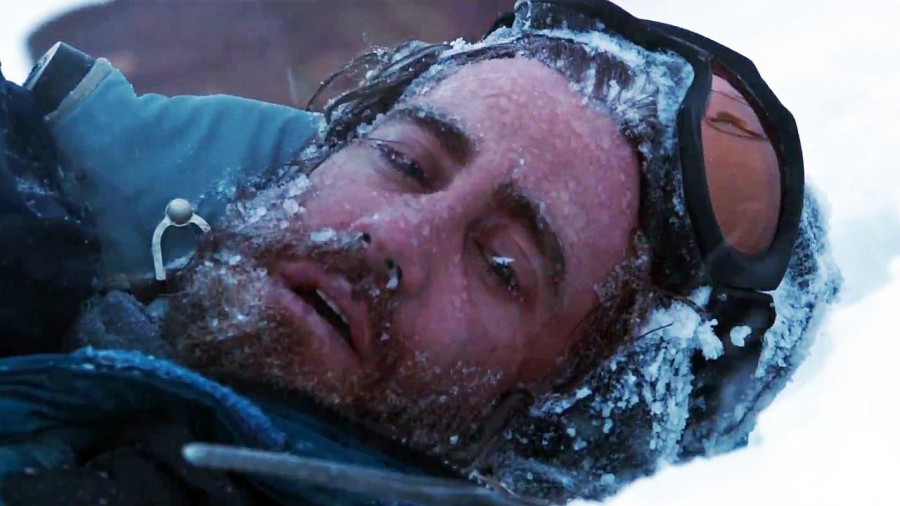“Everest” presents human struggle and unforgiveable terrain
The true story of a1996 Everest expedition came to the big screen this September. The film has delightful acting, nearly tear-inducing moments, and a pace that made me feel like I was actually inching up the mountain.
Baltasar Kormakur directed the film. His past work includes “2 Guns” and “Contraband.” The screenplay was written by William Nicholson and Simon Beaufoy. Nicholson worked on films such as “Gladiator” and “Les Miserables,” and Beaufoy helped write “Slumdog Millionaire,” and the 2010 true-climb flick “127 Hours.” Seems like a pretty solid team.
With their expertise and a cast that includes a few familiar, trusted faces, they still only managed an average film. Jason Clarke leads the expedition as Rob Hall. You might recognize Clarke from other 2015 releases like the “Terminator Genisys,” or “Child 44,” or from his earlier roles in “Zero Dark Thirty,” and “Lawless.”
Hall’s job, when he’s not the loving husband of pregnant Keira Knightley, is to guide climbers up and down Everest without dying. His crew, Adventure Consultants, is matched with other expedition groups that don’t seem to have the high moral standing of Hall. Some are putrid and rude, having a recklessness that screams, “foreshadow!”
Another, like the leader of Mountain Madness, struggles with the bottle. This is fellow master-climber Scott Fischer, played by a very beardy Jake Gyllenhaal. The pre-climb jib-jab between the two is entertaining, and feels, like most other character interactions, a placeholder until Everest decides to unleash.
Other familiar faces include Josh Brolin, who plays the proud Texan Beck Weathers and Emily Watson who stays at basecamp and communicates to the climbers who get caught in the approaching storm. The rest of the main team is comprised of Doug Hansen (played by John Hawkes), and Yasuko Namba (Naoko Mori).
For a film made about real people battling for their lives, no acting performance seemed to dis-mold characters from cookie-cutter personas. If the acting wasn’t as light I might have left the theater sobbing like the 9-year-old Travis who couldn’t believe Leo died in “Titanic.” Either way, it’s tough watching people battle against slow-death cold, and in this shivering struggle the movie was persuasive.
One highlight of the film is that I left smarter. The movie is great at explaining and showing the intense physiological effects that Everest heights have on the human body. Adventure Consultants makes sure their climbers know that the descent is a race against death, as their bodies will begin shutting down. Some of the most gripping scenes were those where all I could hear was ripping, cold wind and coughing, gasping lungs.
What the film does right is teeter-totter between intimate shots of human struggle and the swirling, unforgiving landscape. The intertwining shots help bring authenticity to the story. Cinematographer Salvatore Totino to partly thank for that.
The music is pretty appropriate, high and intense when a climber looses footing, melancholy when frostbitten bodies don’t seem strong enough for more step, and serene and heavenly when one who’s visited by angelic visions of his family. Note: this scene of survival, flickering from frostbitten face to warm family was impressively and intimately shot. Mix it with the reunion scene and wallah, you have the before mentioned “near tears.”
Some of my favorite music composed by Dario Maiianelli happened at basecamp. Prayer flag and temple scenes sent climbers up with blessings and incorporated the music and sounds of Tibetan/Buddhist culture.
The vast Everest landscape was brilliantly shot, and this made it seem worth sitting in the theater for 2 hours. You got to hand it to directors who are willing to film in authentic, freezing temperatures, and to actors who prepare for their roles by climbing mountains.
Honestly, it was the waiting that got me. It was the stretches of silence and wind between radio communication that made me itchy and feel like the movie dragged. Perhaps the filmmaker wanted the trek up and especially the dangerous decent to mimic the reality of wondering whether or not loved ones will make it back to basecamp.
What the movie depicts is the vast power of nature and the strength and will of those who take her on. Everest, the unchallenged star of the film, is said to “make her own weather,” and those who climb seem to do it more out of necessity-to-conquer than choice-to-suffer. I watched them both conquer and suffer.
Travis LeClair joined the Basement Medicine staff in Spring 2014, assuming the position of staff reporter.






